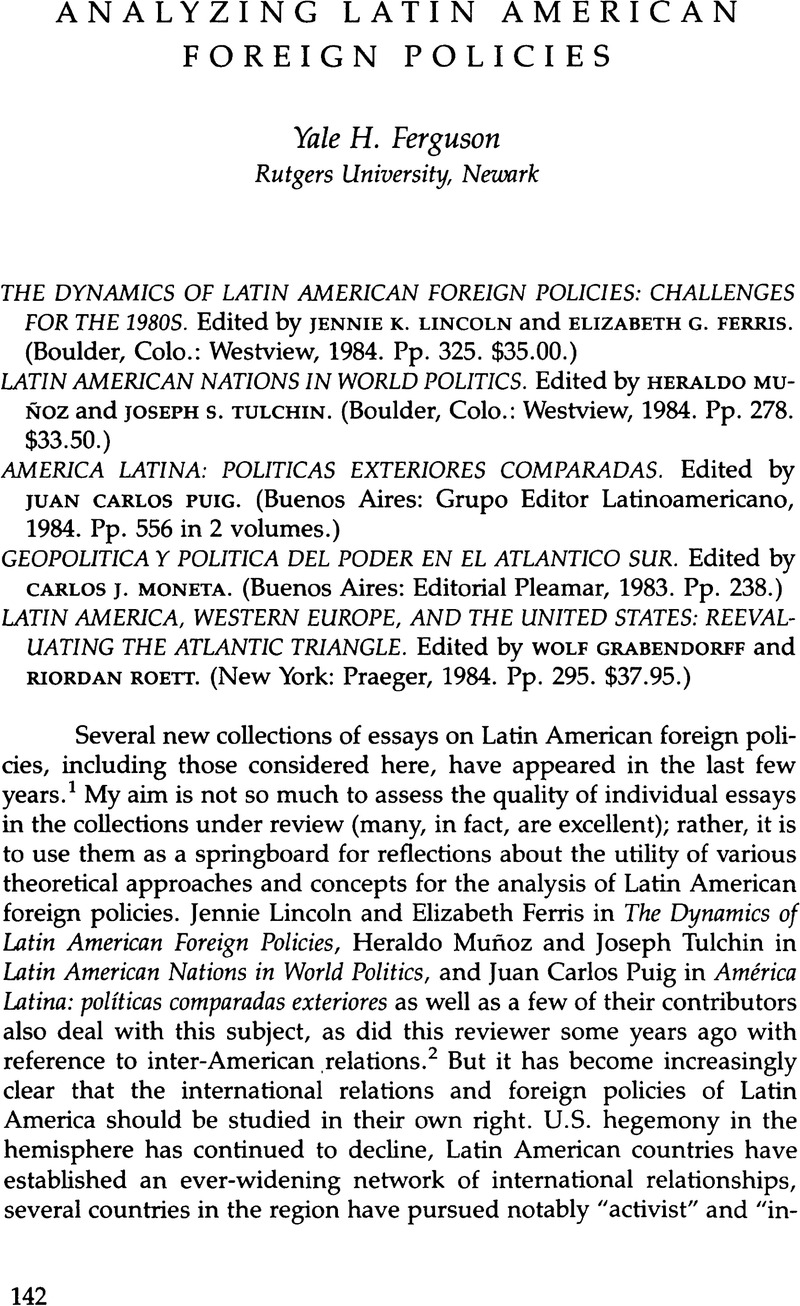No CrossRef data available.
Article contents
Analyzing Latin American Foreign Policies
Review products
Published online by Cambridge University Press: 12 October 2022
Abstract

- Type
- Review Essays
- Information
- Copyright
- Copyright © 1987 by the University of Texas Press
References
Notes
1. The Grabendorff and Roett volume has also been published in Spanish under the title América Latina, Europa Occidental y Estados Unidos: ¿Un nuevo triángulo atlántico? (Buenos Aires: Grupo Editor Latinoamericano, 1984).
2. Contemporary Inter-American Relations: A Reader in Theory and Issues, edited by Yale H. Ferguson (Englewood Cliffs, N.J.: Prentice-Hall, 1972); and Yale H. Ferguson, “Through Glasses Darkly: An Assessment of Various Theoretical Approaches to Interamerican Relations,” Journal of Interamerican Studies and World Affairs 19, no. 1 (Feb. 1977):3–34.
3. W. Raymond Duncan, Latin American Politics: A Developmental Approach (New York: Praeger, 1976), 121.
4. See, for example, Howard J. Wiarda: “Democracy and Human Rights in Latin America: Toward a New Conceptualization,” Orbis 22, no. 1 (Spring 1978):137–60; and Wiarda, Ethnocentrism in Foreign Policy: Can We Understand the Third World? (Washington, D.C.: American Enterprise Institute, 1985).
5. On this subject, see especially John D. Martz and David J. Myers, “Understanding Latin American Politics: Analytic Models and Intellectual Traditions,” Polity 16, no. 2 (Winter 1983):214–41.
6. See Van Klaveren in Muñoz and Tulchin, 15. The reference is to Edward González, “Institutionalization, Political Elites, and Foreign Policies,” in Cuba in the World, edited by Cole Blasier and Carmelo Mesa-Lago (Pittsburgh: University of Pittsburgh Press, 1979), 3–36.
7. See Carlos Pérez Llana, “Brazil and Western Europe in a Global Context,” in Grabendorff and Roett, 124–46. Although Pérez Llana personally is not especially optimistic about Brazil's prospects in this regard, he comments, “The idea of the possibility of a ‘jump,’ both qualitative and quantitative, to ‘rich country’ status is permanently in the minds of a large sector of the Brazilian elite” (p. 132).
8. See Margaret Daly Hayes, “Brasil y el Atlántico Sur: cambios en las perspectivas de un problema que se vislumbra,” in Moneta, 89–102.
9. In his introduction to the Grabendorff and Roett collection, Wolf Grabendorff poses the question “A New Atlantic Triangle?” He and most of the authors in the collection express considerable doubt as to whether the answer is “yes.”
10. Gordon in Lincoln and Ferris, 87. He refers to Edward S. Milenky, Argentina's Foreign Policies (Boulder, Colo.: Westview Press, 1978), 3–5.
11. George W. Grayson, The United States and Mexico: Patterns of Influence (New York: Praeger, 1984), 126.
12. Ibid., 128–29.
13. Lawrence Freedman, “The War of the Falkland Islands, 1982,” Foreign Affairs 61, no. 1 (Fall 1982):196–210.
14. William E. Brock, “Trade and Debt: The Vital Linkage,” Foreign Affairs 62, no. 5 (Summer 1984):1045.
15. See, for example, Cole Blasier, The Giant's Rival: The USSR and Latin America (Pittsburgh: University of Pittsburgh Press, 1983), chap. 5; and Wolf Grabendorff, “Cuba's Involvement in Africa: An Interpretation of Objectives, Reactions, and Limitations,” Journal of Interamerican Studies and World Affairs 22, no. 1 (Feb. 1980):3–29.
16. Viron P. Vaky subsequently appropriated it as part of the title of his article, “Hemispheric Relations: ‘Everything Is Part of Everything Else’,” Foreign Affairs 59, no. 3:617–47. This issue is entitled “America and the World 1980.”




